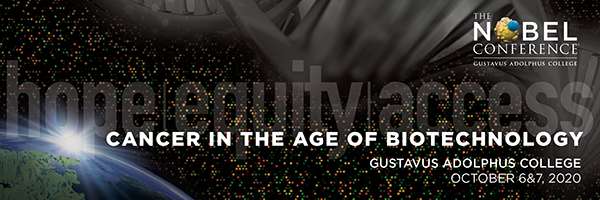The Nobel Conference 56, Cancer in the Age of Biotechnology, will take place primarily online this October due to the ongoing COVID-19 pandemic, Gustavus Adolphus College President Rebecca Bergman announced today.
“For over five decades, the Nobel Conference has brought nearly 5,000 learners to our campus each fall to engage with cutting-edge science topics and the ethical issues that arise alongside them,” Bergman said. “After carefully considering COVID-19 modeling and Minnesota Department of Health guidelines for group gatherings, we have decided to transition the 2020 conference to an online format.”
This year’s Nobel Conference, which will take place October 6 & 7, 2020, explores the science of new cancer treatments, the structural and societal factors that will determine who has access to these life-saving treatments, and the therapies and practices that will enable people to live with cancer for the long term. More information, including a full slate of confirmed speakers, is available on the Nobel Conference website.
Plans are being developed to deliver the Nobel Conference’s signature mix of expert lectures, audience engagement, and breakout sessions in a virtual format. Led by Conference co-chairs Laura Burrack, assistant professor of biology, and Dwight Stoll, professor of chemistry, the planning committee will prioritize opportunities for discussion and questioning among panelists and with the audience. If circumstances allow, the speakers will travel to campus and be together to deliver lectures and engage in panel discussions with appropriate social distancing.
“Our standard of excellence remains high,” Nobel Conference Director Lisa Heldke said. “While we will miss the opportunity to bring our audience face-to-face with some of the world’s top experts, we are also excited to share this important topic with an even broader audience.”
The virtual conference will be offered free of charge. Those who have already purchased tickets will be offered refunds or can choose to donate their ticket cost to the non-profit Nobel Conference in support of programming efforts.
“The Nobel Conference has always invited diverse audiences—high school and college students, lifelong learners, academics, and working professionals—to take a deep dive into an important topic,” Heldke said. “This is an opportunity to do that in new and innovative ways.”
More information will be posted on the Nobel Conference website as planning continues.
About The Nobel Conference
 The Nobel Conference links a general audience, including high school students and teachers, with the world’s foremost scholars and researchers in discussion centered on contemporary issues relating to the natural and social sciences. The Nobel Conference is the first ongoing educational conference of its kind in the United States. It is made possible through income generated by a Nobel Conference Endowment and the support of annual conference contributors.
The Nobel Conference links a general audience, including high school students and teachers, with the world’s foremost scholars and researchers in discussion centered on contemporary issues relating to the natural and social sciences. The Nobel Conference is the first ongoing educational conference of its kind in the United States. It is made possible through income generated by a Nobel Conference Endowment and the support of annual conference contributors.

Leave a Reply
You must be logged in to post a comment.